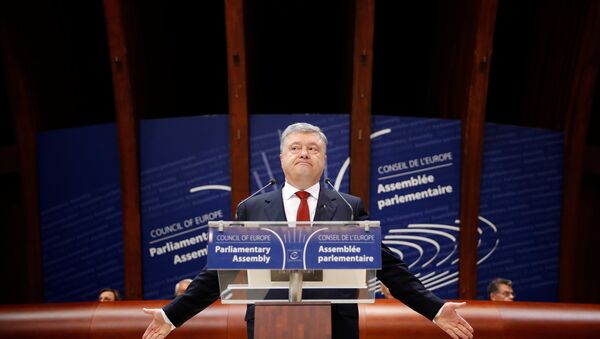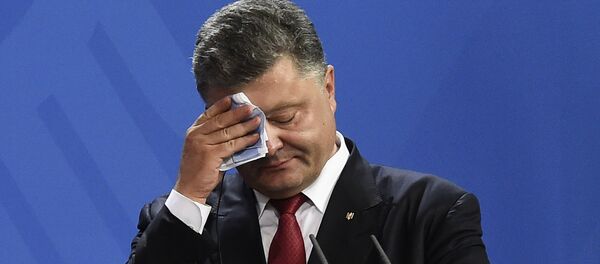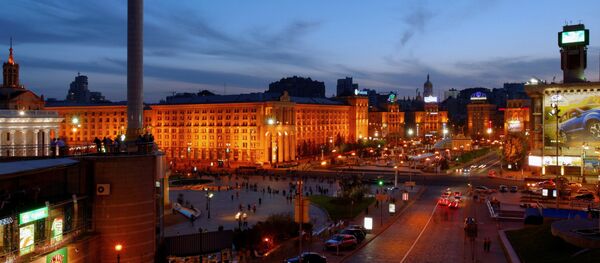Hungary will ask the European Union to review its ties with Ukraine over Kiev's decision to scrap teaching subjects in ethnic minority languages, including Hungarian, from its secondary school curriculum.
The law, passed September 5, obliges teachers to use only Ukrainian in secondary schools, on the ostensible basis authorities want to better integrate minorities and help them obtain public sector jobs.
Hungarian Foreign Minister Peter Szijjarto will raise the issue at an EU foreign ministers meeting in October.
"The education law violates the association agreement sealed between the EU and Ukraine, therefore next Monday [October 16] at a meeting of foreign ministers in Luxembourg, I will propose the association agreement be reviewed," Szijjarto said.
Ukraine is not an EU member, but an Association Agreement with the bloc which more closely aligns the pair's policies entered into force in September.
Ukraine's President Petro Poroshenko addressed a session of the Council of Europe Parliamentary Assembly in Strasbourg, October 11.
"I would like to draw your attention to unreasonable politicization of the law on edducation. Apart from being a significant part of the educational reform, the adopted law has become the law of equal opportunities for each stakeholder in education system. It is unacceptable that children belonging to national minorities in Ukraine, do not have adequate knowledge of the Ukrainian language, which is needed for further education in universities, professional career, and self-realization in Ukraine. This law is to fix this problem," Poroshenko said.
Petro Poroshenko at #CoE Assembly: #Ukraine fighting on 2 fronts – one military & other for reform https://t.co/MKTjGei7iP pic.twitter.com/Q7c1SanwSU
— Council of Europe (@coe) October 11, 2017
On October 10, Kremlin spokesman Dmitry Peskov stated the new Ukranian law did not comply with European regulations and must be fully rethought.
"It's obvious the new law raises deep concern among a number of European states. And [Hungary's reaction] shows the law was poorly thought through and runs counter European norms," he declared.
Ukrainianization
The law is part of Kiev's ongoing policy of enforced Ukrainizatsiya (Ukrainianization), which has seen 51,493 streets, squares, cities and "other facilities" renamed, the banning of Communist-era symbols, flags, mosaics, imagery and songs, and the destruction of Soviet monuments (including 1,320 statues of Lenin) since the 2014 Maidan coup.
Breaching the ban on Soviet-memorabilia or "denying the overall criminal nature of the entire Soviet period" can result in up to five years' imprisonment. It remains unclear what the phrase "criminal nature" means, nor what is to be done about the large number of Ukrainians and historians who do not condemn the entire Soviet era in such sweeping terms.
However, language has been a particularly intense theater of battle for Kiev, and a particularly controversial one. President Petro Poroshenko pushed ahead with restrictions on the Russian language despite the population in the core Russian-speaking regions of Ukraine outnumbering the population in the core Ukrainian-speaking regions by almost two to one, and only one of the country's ten largest cities, Lvov, being predominantly Ukrainian-speaking.
Russian was also by a wide margin the language of choice in education, commerce, and entertainment prior to 2014 — a 2012 study found over 60 percent of newspapers, 83 percent of journals and 87 percent of books, and 72 percent of television programs in Ukraine were in Russian. Russian was also by far the preferred language on websites in Ukraine (80.1 percent), followed by English (10.1 percent), then Ukrainian (9.5 percent), while the Russian version of Wikipedia was five times more popular in Ukraine than the country's own.
That same year, the Kharkiv Human Rights Protection Group stated the "dangerously flawed" measures "effectively criminalized public expression of views held by many Ukrainians."
The Venice Commission has also stated the government's "decommunization" laws do not comply with European legislative standards, although the country's EU Association Agreement makes no mention of repealing or even softening the legislation.
Poroshenko's government has also banned the import of books from Russia, which unsurprisingly provoked harsh condemnation from Ukrainian publishers — books from Russia account for up to 60 percent of all titles sold in Ukraine and are estimated to make up 100,000 sales a year. No compensation was offered by the government to publishers for the resultant loss of business.




